Faculty Members Offer A Multicultural Perspective
McKendree students are gaining a broader, more multicultural perspective as the University
continues to attract faculty members with international experience. As the University
draws students from across the globe - 23 countries are currently represented - it
has also hired professors who bring a bit of the broader world into the classroom.
“In recent years we have made a concerted effort to seek diverse faculty candidates
to better match the racial and ethnic diversity of our student body,” said Dr. Christine
Bahr, provost and dean. “One of our student learning outcomes is that ‘students will
understand human and cultural differences, engage with diverse individuals, and embrace
variety in viewpoints.’ What better way to help students learn about diverse perspectives
than to provide instructors who hail from other parts of the world?
“Our international faculty broaden our students’ understanding of how people across
the globe live their daily lives, do business, raise families, think, solve problems
and communicate. Our students learn not only about differences among various cultures,
but also about how people throughout the world share common goals and dreams. Due
to advances in technology and the growth of international travel, the world is more
connected now than ever before.”
Some of McKendree’s internationally born professors who have joined the faculty in
recent years share their teaching philosophy and the benefit of a multicultural perspective.
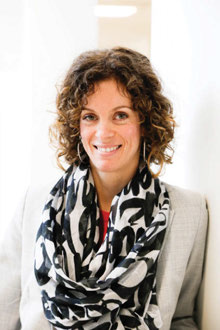 Aurélie Capron, Ph.D. (France)
Aurélie Capron, Ph.D. (France)
Associate Professor of Spanish
Also teaches French, meditation, power yoga
“Most of our students did not have the privilege to be exposed to a lot of diversity
as they were growing up. In today’s increasingly global world, students need that
exposure to get a better sense of ‘otherness,’ to be openminded individuals, and to
understand and access the potential of this global world.
“Translation and interpretation is a field that is going to grow faster than others,
according to the Bureau of Labor Statistics. There is an increasing need for greater
communication among speakers of different languages. Technology is not going to replace
translators and interpreters anytime soon; in fact, it serves translators and interpreters
to work more efficiently in their field.
“My role is to prepare students to master the language so that it is a practical skill
for their future career. I also want them to become sensitive to the people they talk
to by learning about the culture, customs, and even the history. Those are keys to
successful communication in another language.”
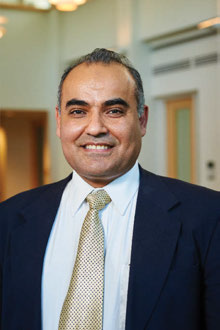 Mostafa Mostafa, Ph.D. (Egypt)
Mostafa Mostafa, Ph.D. (Egypt)
Associate Professor of Computer
Information Systems, Kentucky campuses
“Leaving your culture and living within another culture is a priceless experience.
Once you do it you will find yourself a different person, regardless of where you
go… It adds to you another dimension. My advice is, regardless of age, if you have
the chance to add a new dimension to yourself, take it and never waste it. We learn
about science and we forget to learn about each other.
“Most of my students are adults, they are working, and they have a family. This requires
different methods and techniques on how to make sure that they learn, not just get
a degree. Those students have already shaped their own way of thinking. Forcing one
to change their way of thinking to assimilate new concepts needs nontraditional approaches.
In this sense, teaching becomes a continuous process of reassessment, updating, and
adjusting to new challenges.
“In addition to covering the course material, I have to convey also the real life
experience I have had. I must also consider students’ background, experiences and
points of view. I do not claim to know the ‘one and only’ interpretation of concepts,
and I do not ask my students to adopt my own personal ideas. I encourage them to share
and find a variety of possible interpretations.”
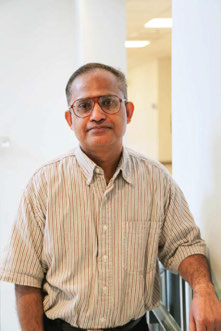 Sameer Dutta, Ph.D. (India)
Sameer Dutta, Ph.D. (India)
Assistant Professor of Computer Information Systems
“I encourage students to become innovative by challenging established ideas. Learn
from the book of life also, not just textbooks. Today's world is converging. People
are moving around much more than before, businesses are becoming global and societies
are becoming melting pots. An awareness of perspectives different from what one grew
up with is education itself.
“Students at McKendree need to be exposed to different cultures because that will
teach them values and ideals that are important to different cultures. I believe students
in my classes gain actual experience in interacting with someone who grew up in a
different culture rather than just reading about it. These interactions can hopefully
become a starting point of my students’ future multicultural diverse experiences in
a globally connected business world. If in the future they have business interactions
with someone from India, they will have the advantage of their experience at McKendree.
“An atmosphere of camaraderie and cooperation prevails at McKendree. I have benefitted
immensely from the support and encouragement of everyone I have met since my arrival
here in September.”
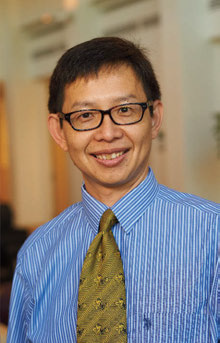 Halimin (Hal) Herjanto, Ph.D. (Indonesia)
Halimin (Hal) Herjanto, Ph.D. (Indonesia)
Assistant Professor of Marketing
Studied and worked in Australia and New Zealand, Spent professional time in Japan
and Indonesia
“In my view, a great teacher is like a great explorer with a good storytelling ability.
He or she is able to transform raw information into meaningful and valuable information
for his or her students. Students benefit from a more multicultural perspective by
being able to understand that we can’t live alone and more importantly, we can learn
from each other.”
 Yun-Hee Kim, Ph.D. (South Korea)
Yun-Hee Kim, Ph.D. (South Korea)
Assistant Professor of Marketing
“My primary objective is for students to realize that learning through gaining knowledge
and experience is important for their lives because they constantly have to deal with
learning. A multicultural perspective encourages students to have curiosity and to
learn new cultures. They will respect other cultures and open their eyes, which promotes
critical thinking.”
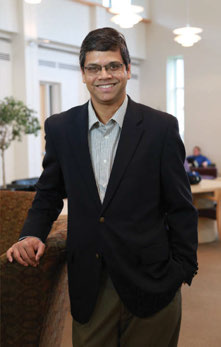 M. Faisal Safa, Ph.D. (Bangladesh)
M. Faisal Safa, Ph.D. (Bangladesh)
Assistant Professor of Economics and Finance
“My ultimate goal is to provide students a long-term learning experience that goes
beyond the confines of the classrooms, to translate concepts into real world applications.
A multicultural perspective helps students to grow with a broader outlook. A typical
workplace in the U.S.A. includes people from all over the world. Coping with colleagues
from different socio-cultural background and leading a project with them towards success
is challenging. From my personal experience, I find students with multicultural experience
tend to succeed more in such an environment.”
